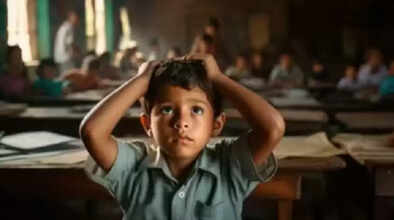Why are children afraid of mathematics? The condition of third-grade children is miserable, the NCRT report reveals

Math Fear in Children: NCERT report reveals that many third-grade students are not able to understand even basic mathematics. Know why the fear of mathematics is increasing in children.
Math Fear in Children's: There was a time when children were asked what they want to become when they grow up? And the answer was engineer, scientist or doctor. But today when the same question is asked to children, a fear comes before the answer, mathematics is very difficult. This fear about mathematics is gradually getting into the minds of children.
Recently a report of NCERT (National Council of Educational Research and Training) has brought this fear to the fore. The report has revealed that most of the third grade students are not able to do even basic mathematics, such as addition, subtraction, multiplication or division skills properly. This not only raises questions on the education system of children, but is also a warning for parents and teachers.
For your information, many students are making mistakes even in two-digit numbers. Some children have problems in understanding the question itself, that is, their grasp of mathematical language is weak. Understanding and solving word problems has become a challenge for children.
Falling confidence in mathematics?
Rote-based education system
Instead of explaining concepts to children, they are just made to memorize the answers. This prevents them from connecting with real calculations.
Mathematics being made a scary subject
Parents or teachers often say, "Maths is not easy", due to which children already consider it difficult.
Lack of practice
Mathematics is a subject in which continuous practice is necessary. If practice is not done daily, the child falls behind quickly.
Increasing dependence on technology
Calculators, mobile apps, and games have taken children away from mental calculations.
What can be done?
Concept-based studies should be started, in which the child does not only memorize the answers, but also understands what he is doing.
Mathematics should be taught through games and stories so that children remain interested.
Parents should also involve children in mathematical activities at home, like making them do addition and subtraction while buying vegetables.
Teachers should be trained to understand the difficulties of children and teach them according to their pace.

